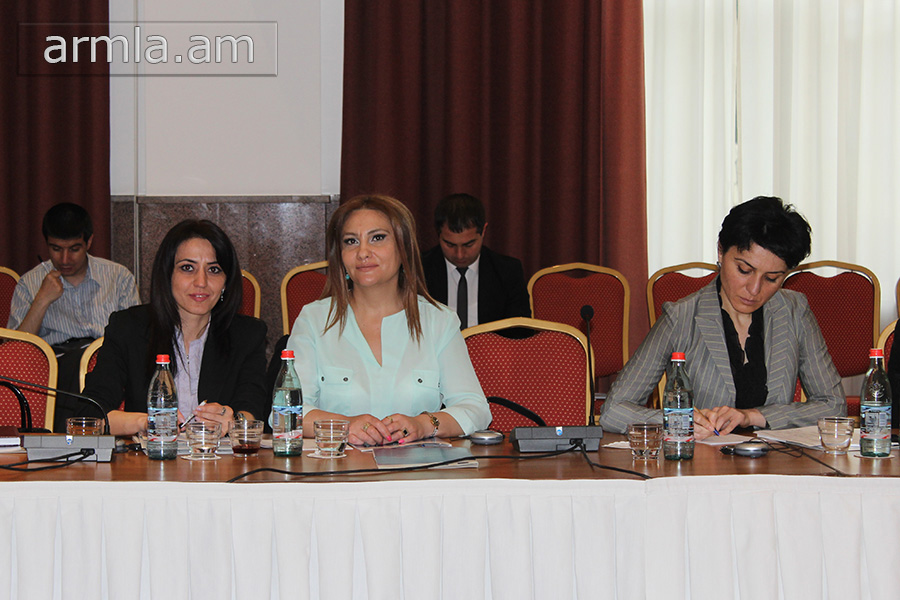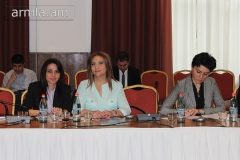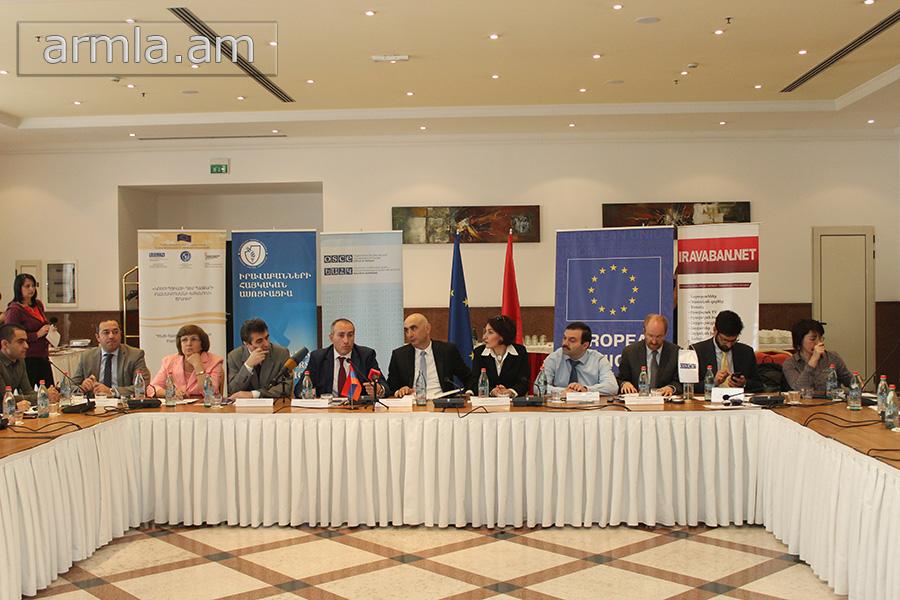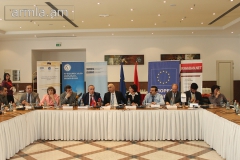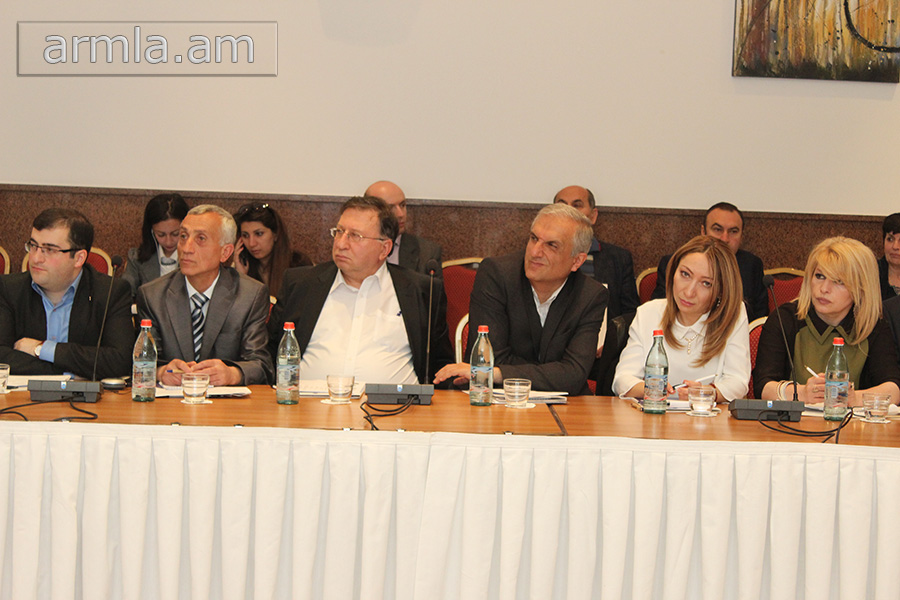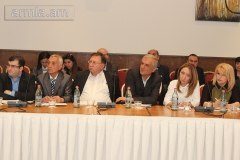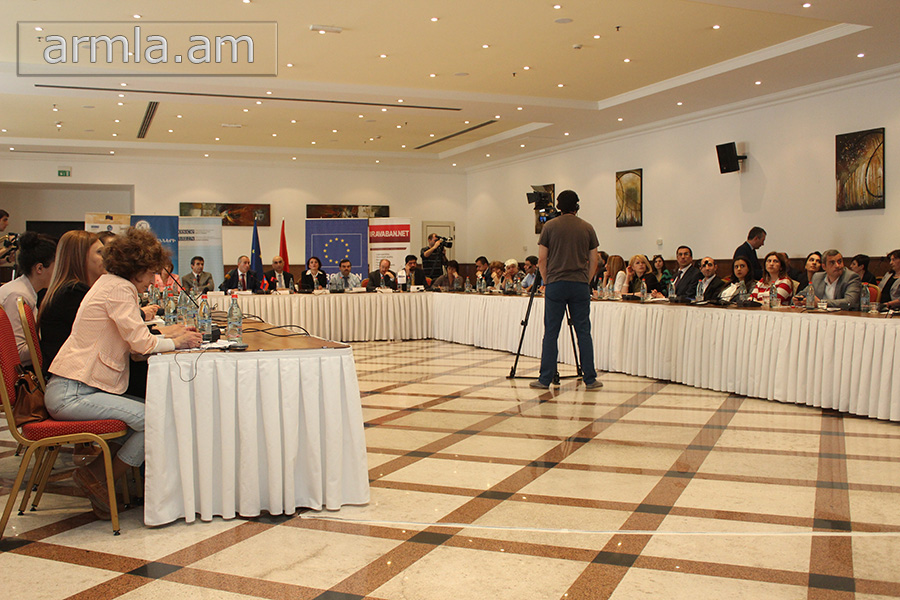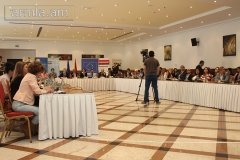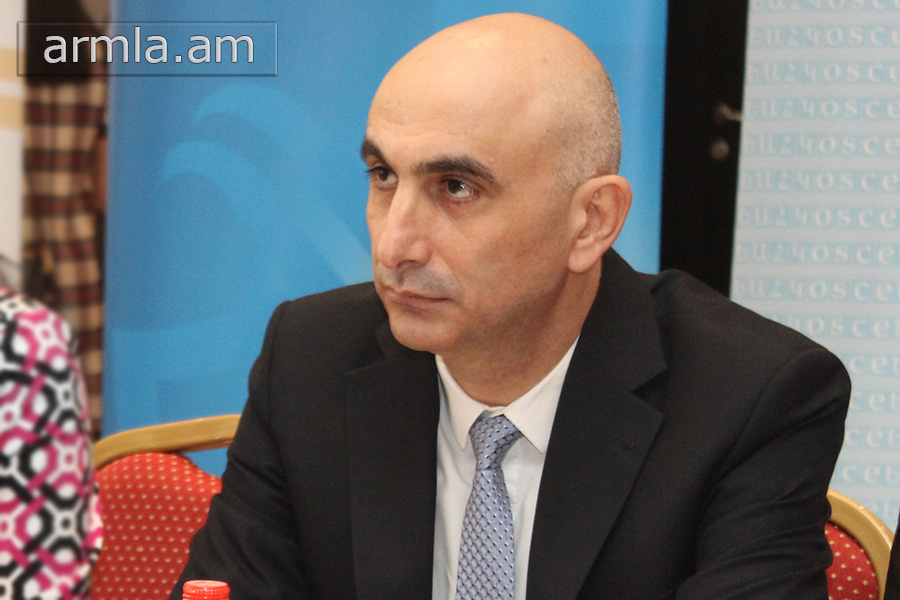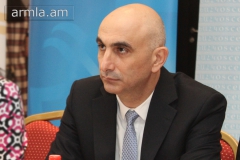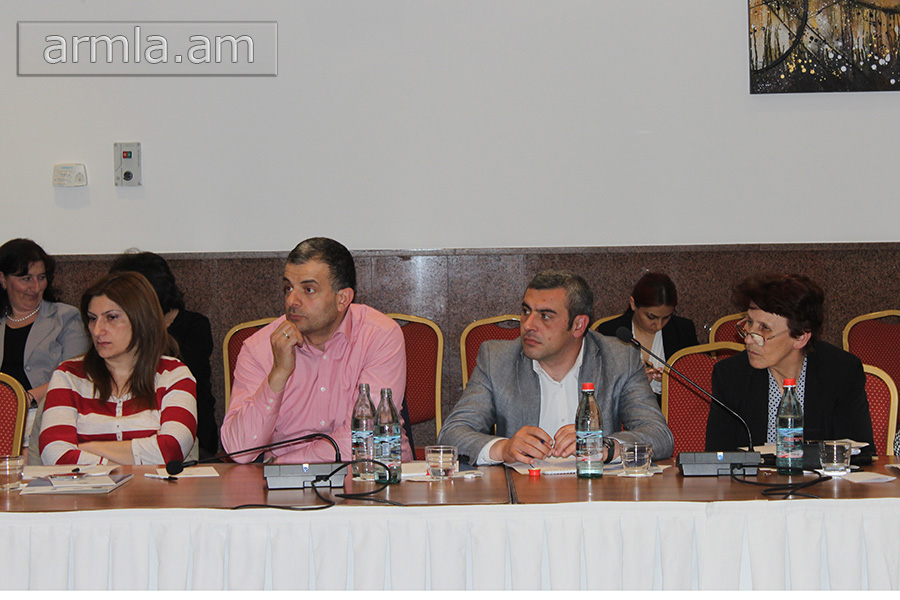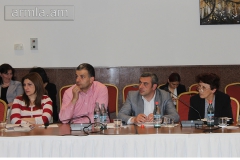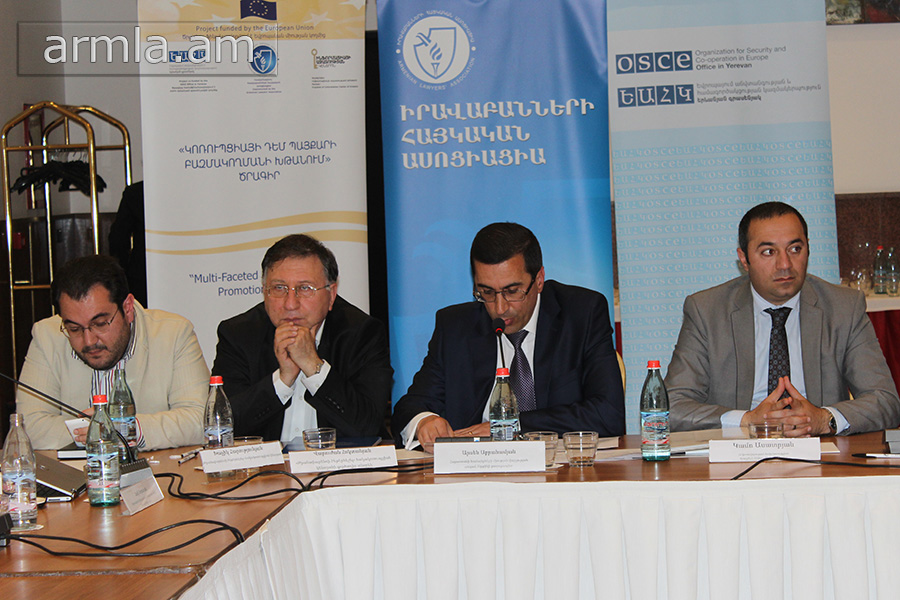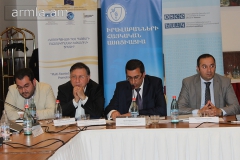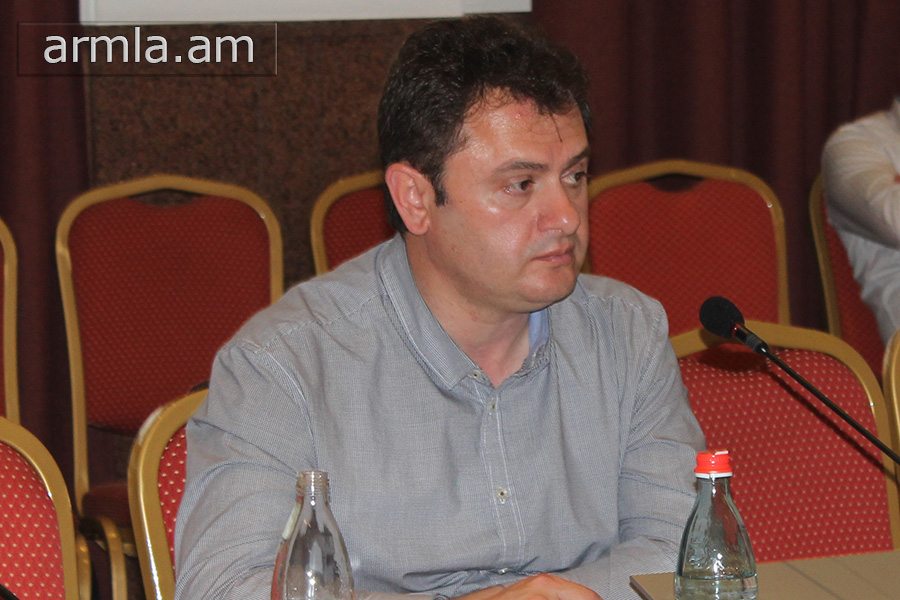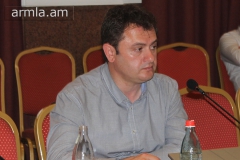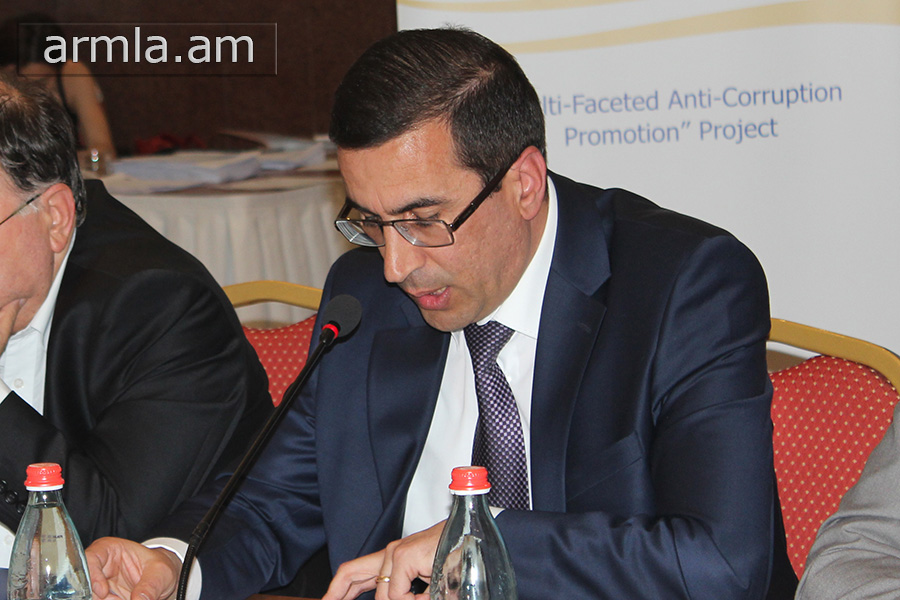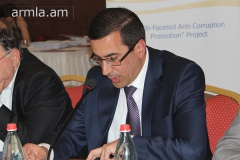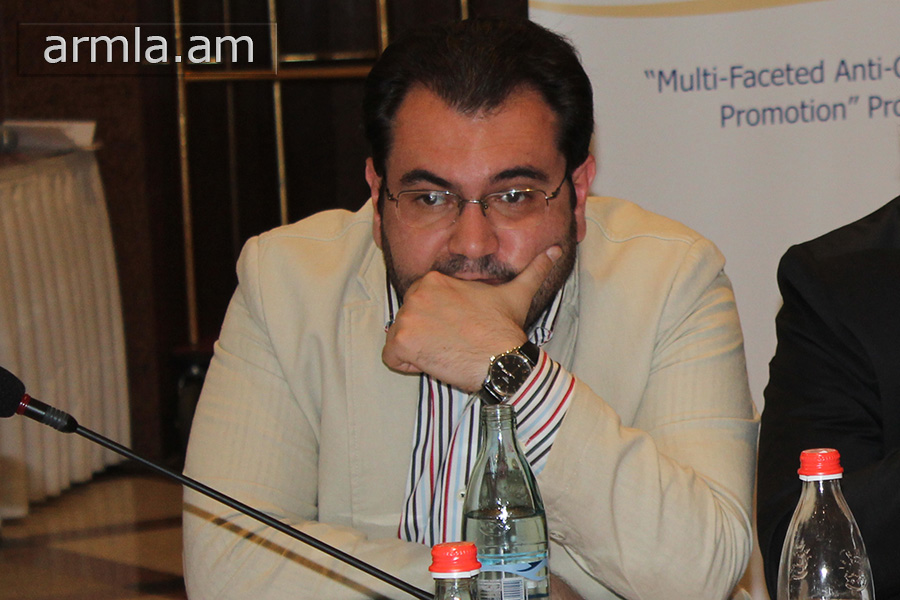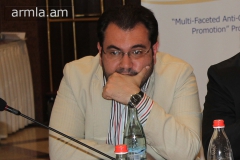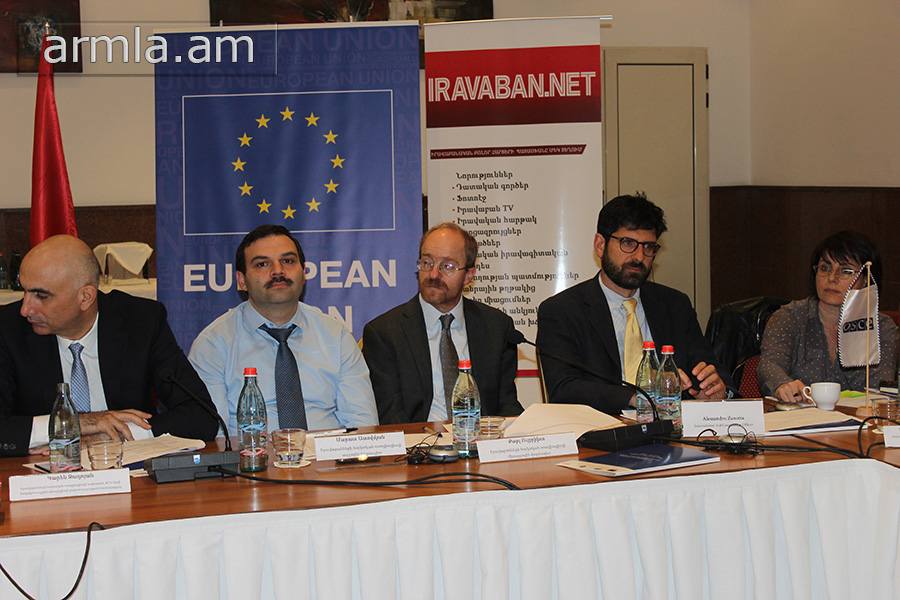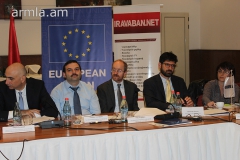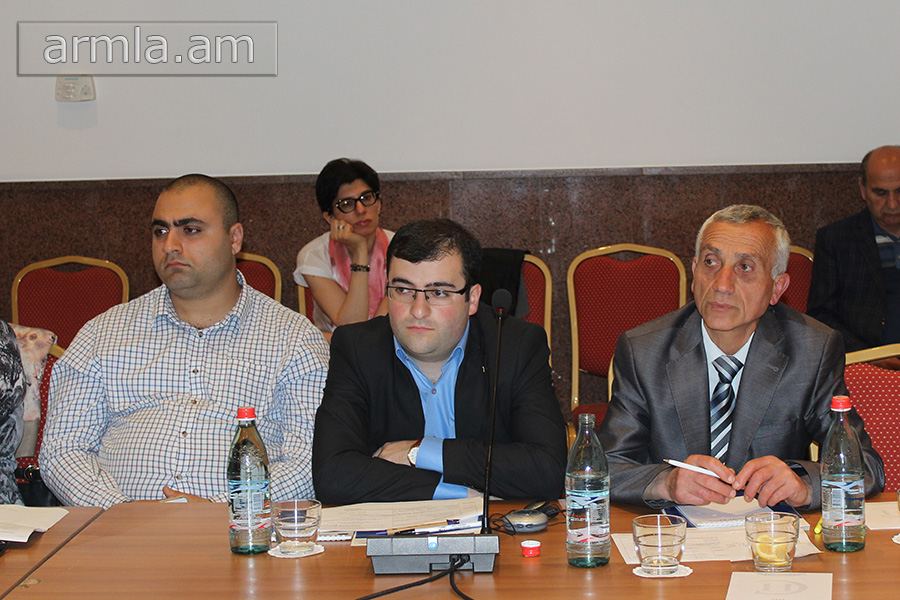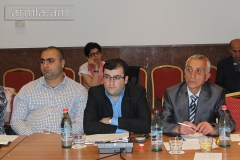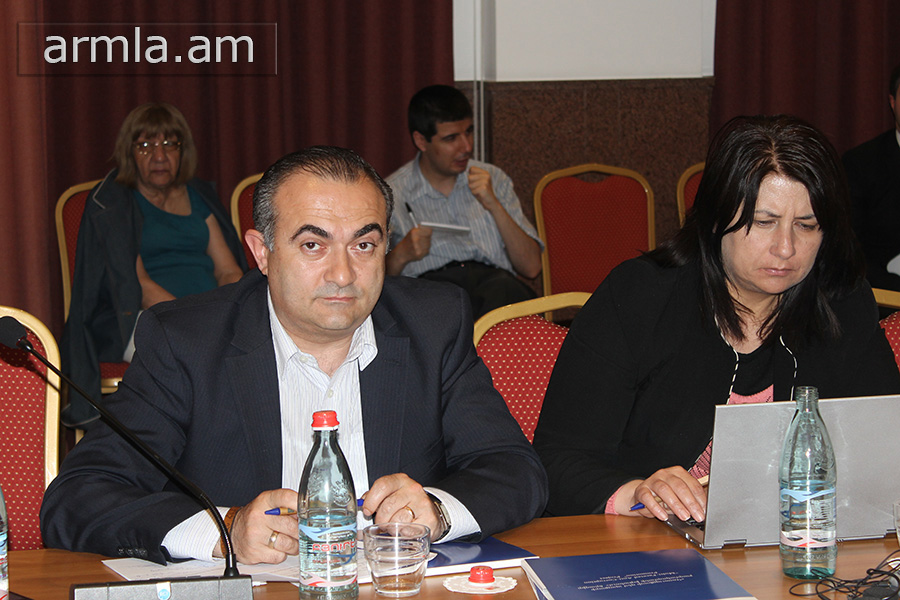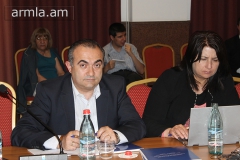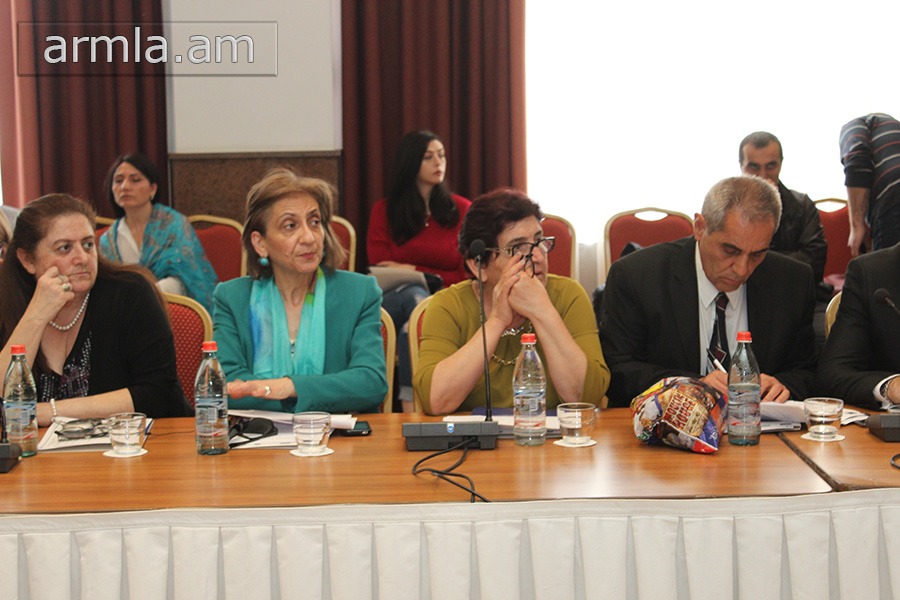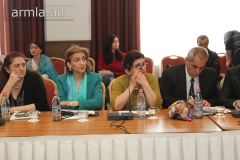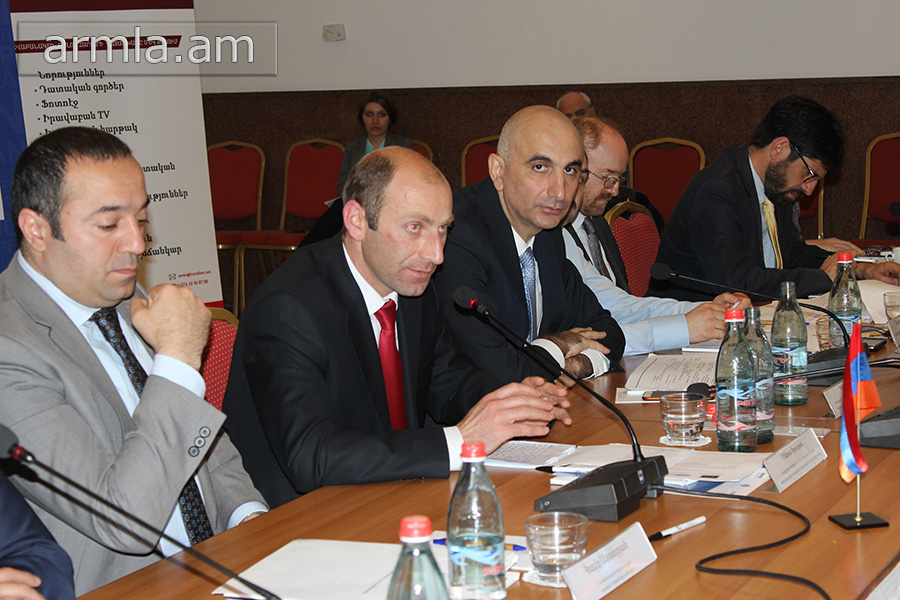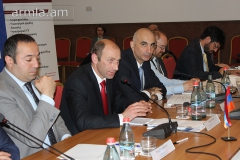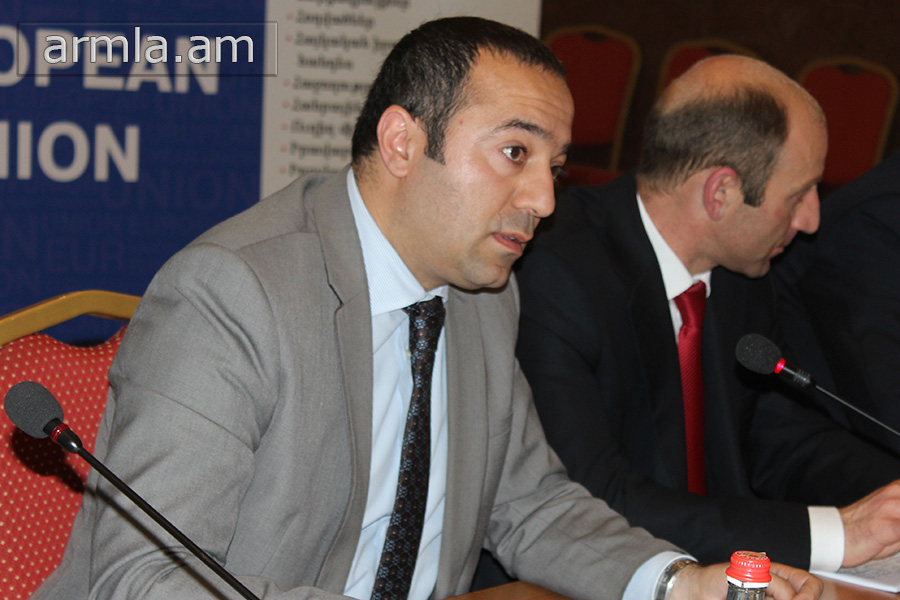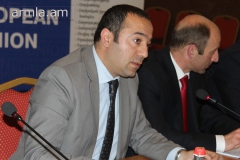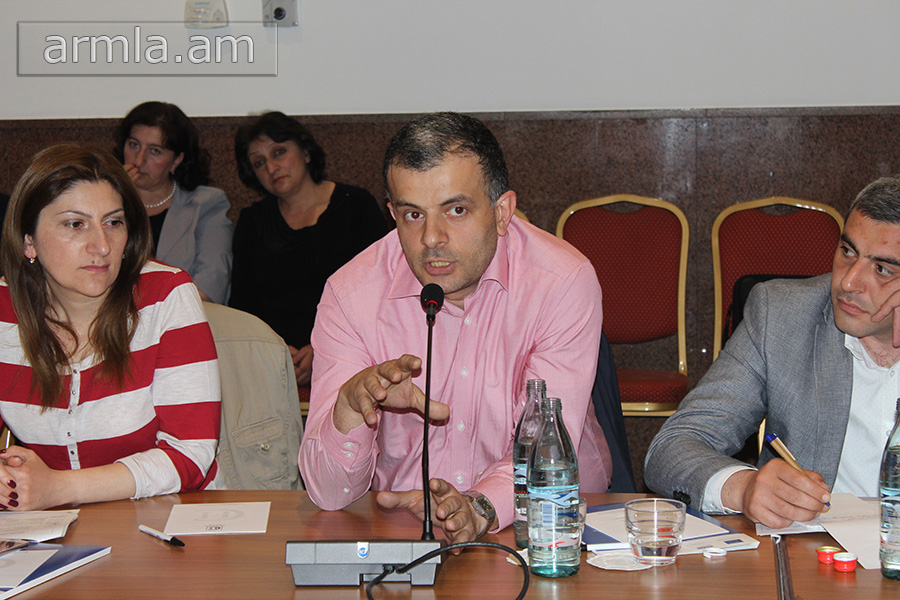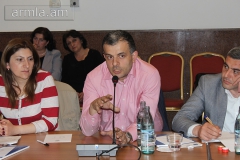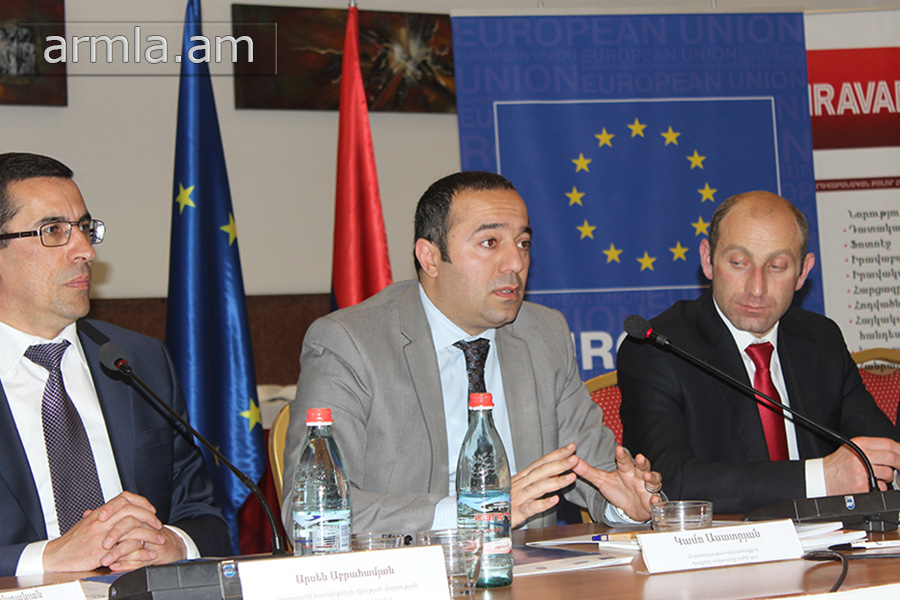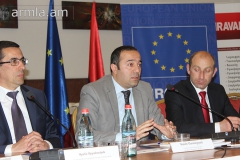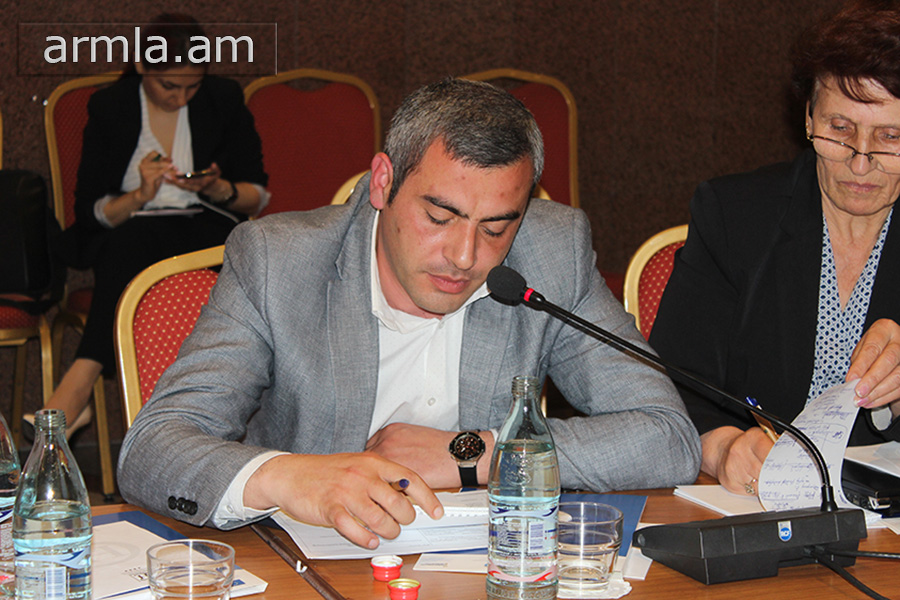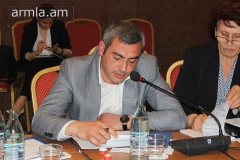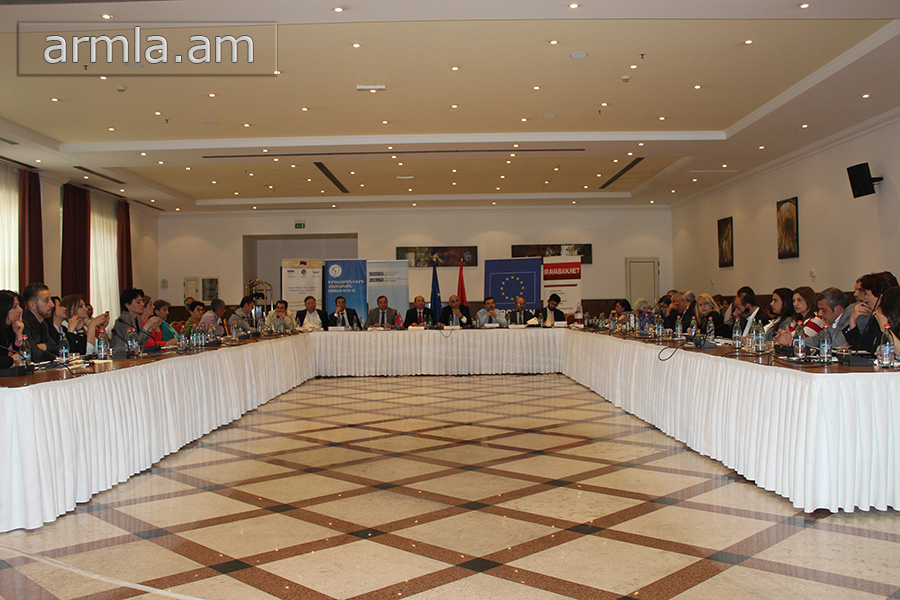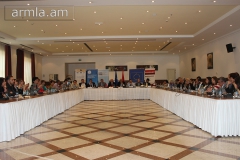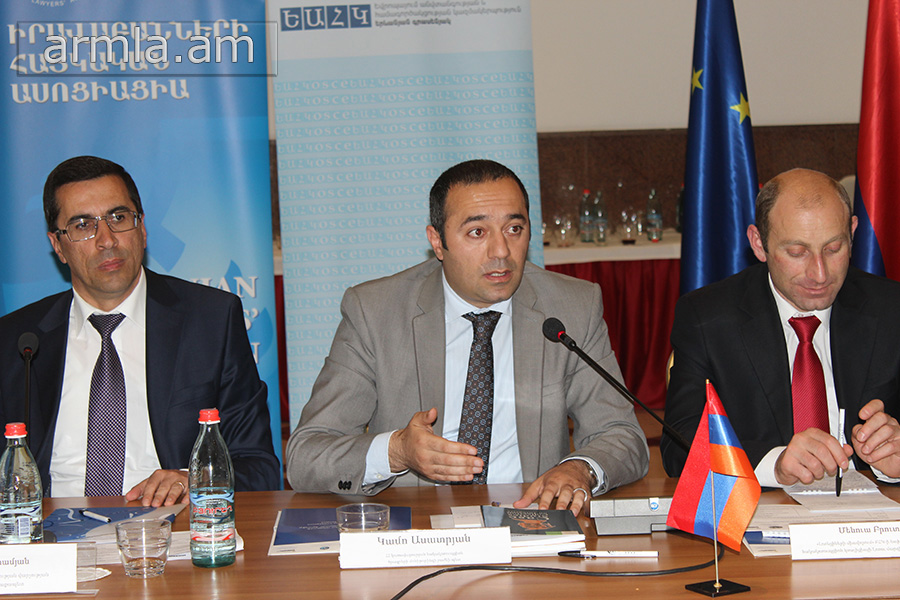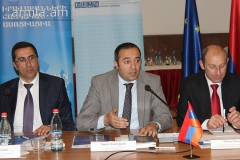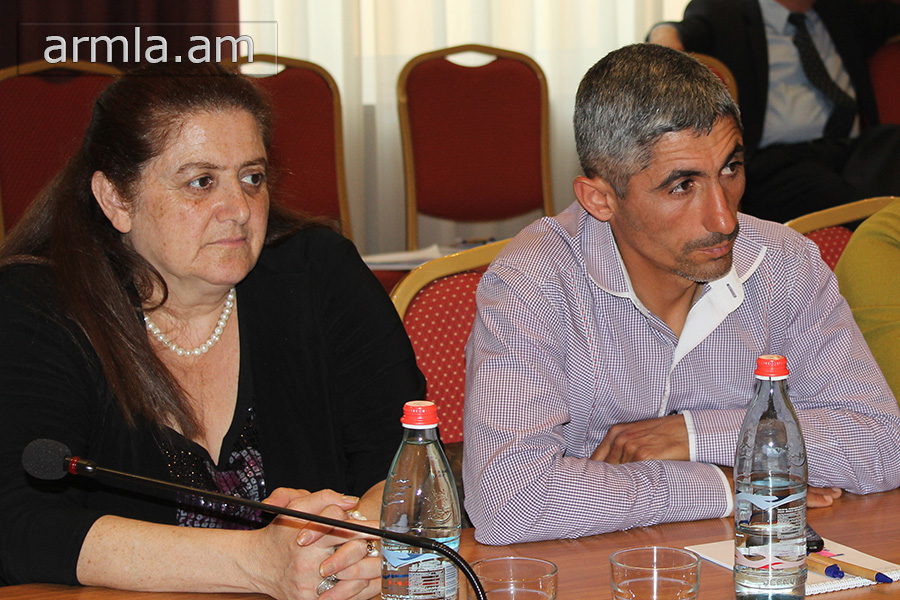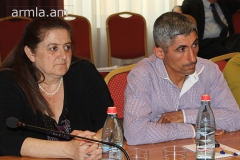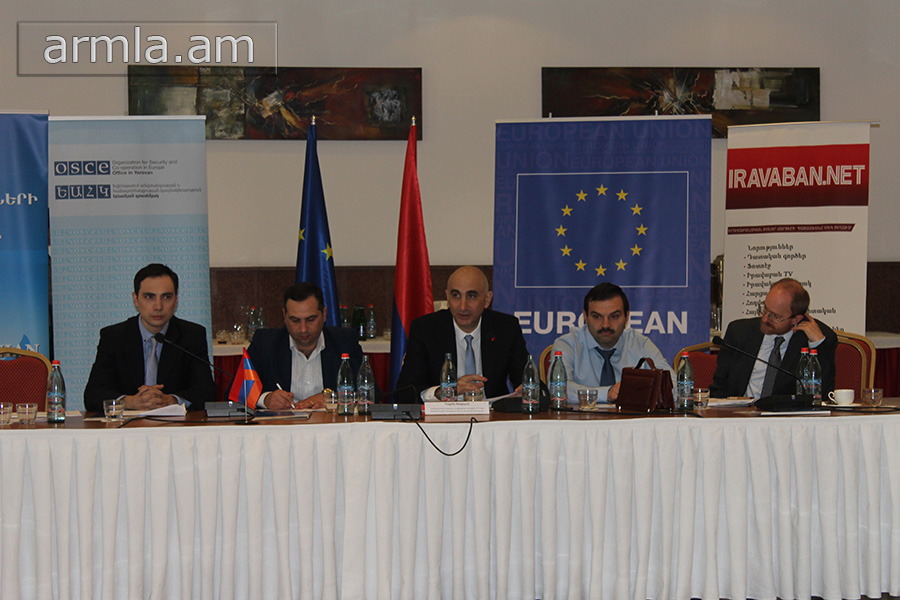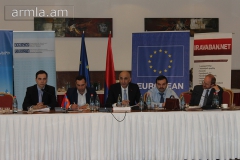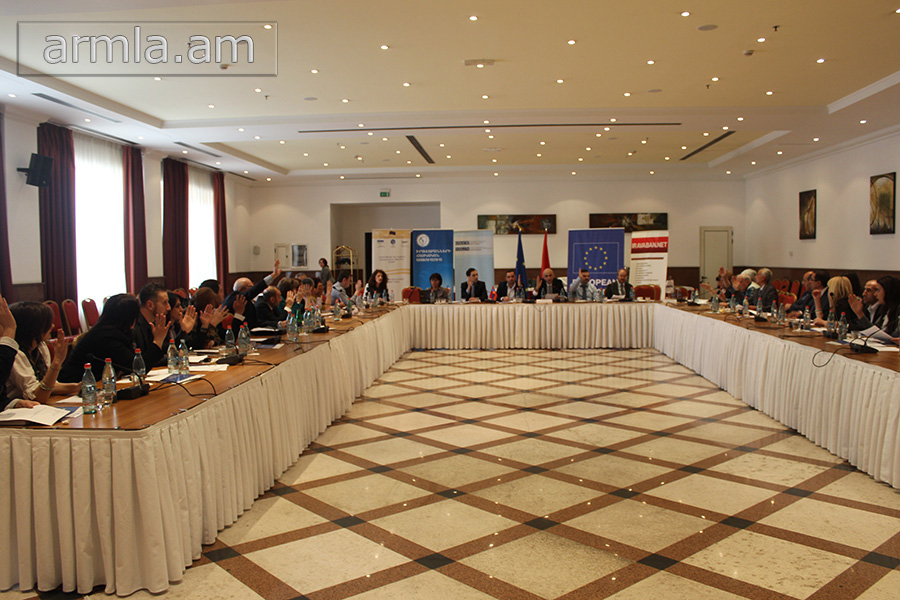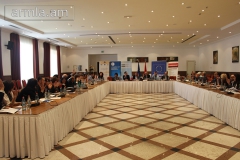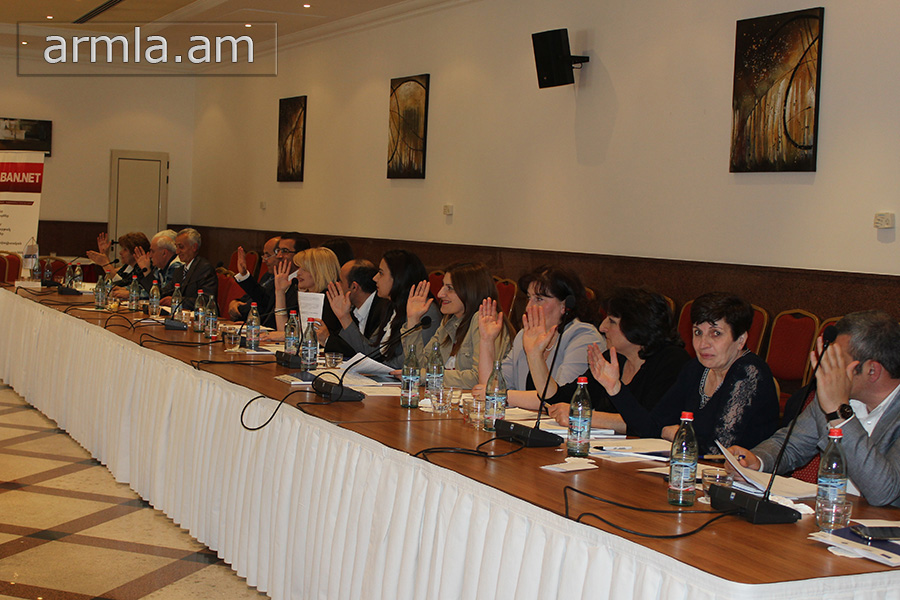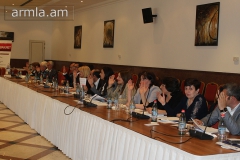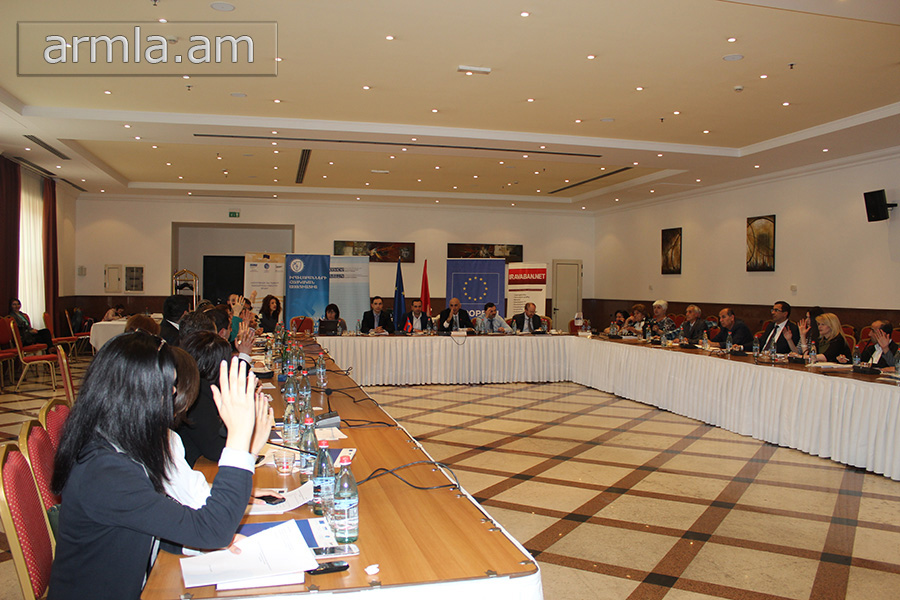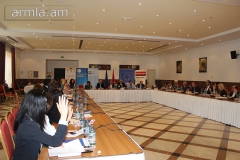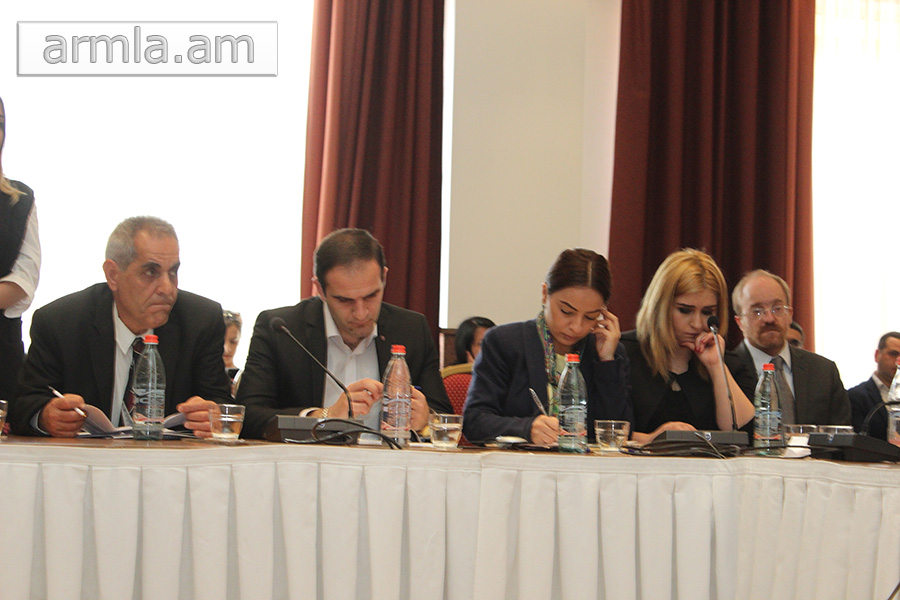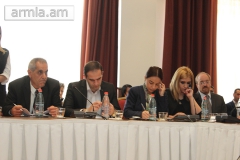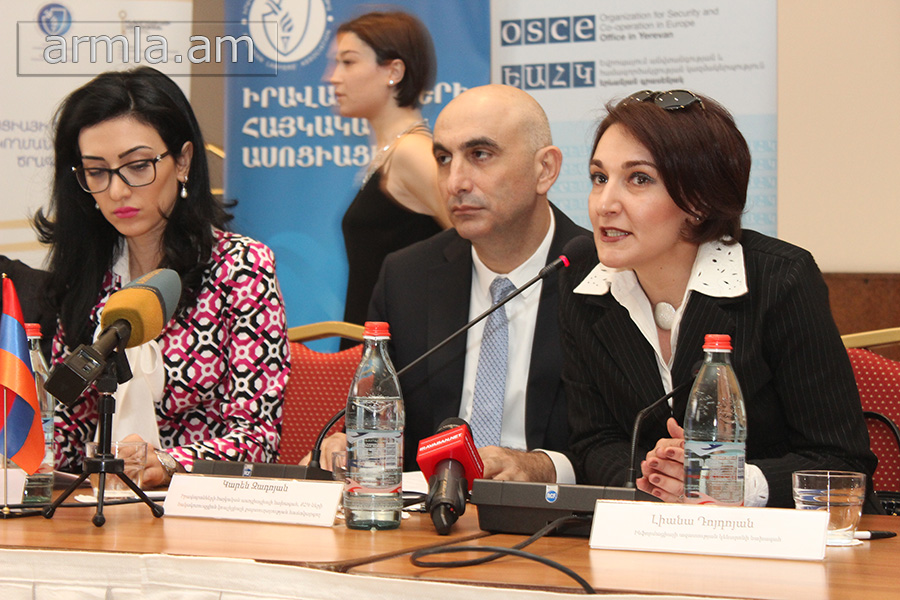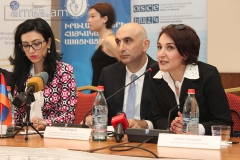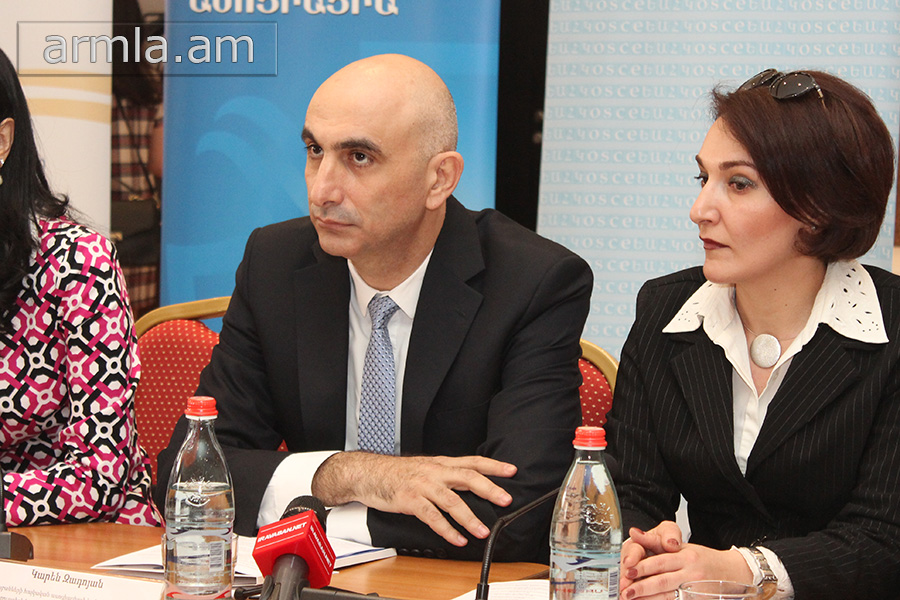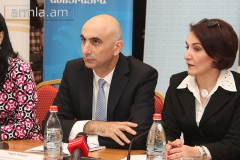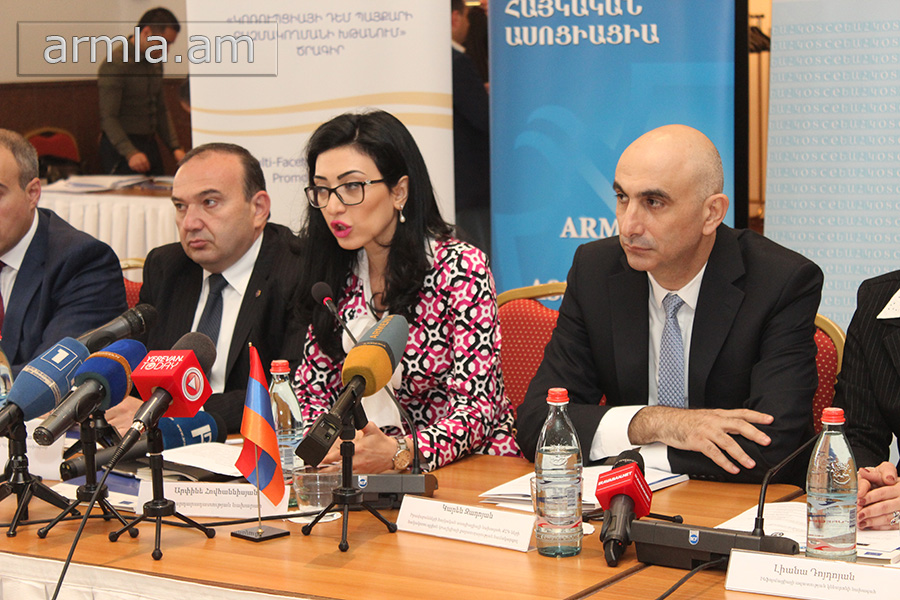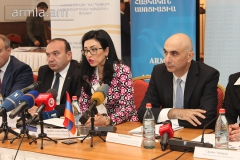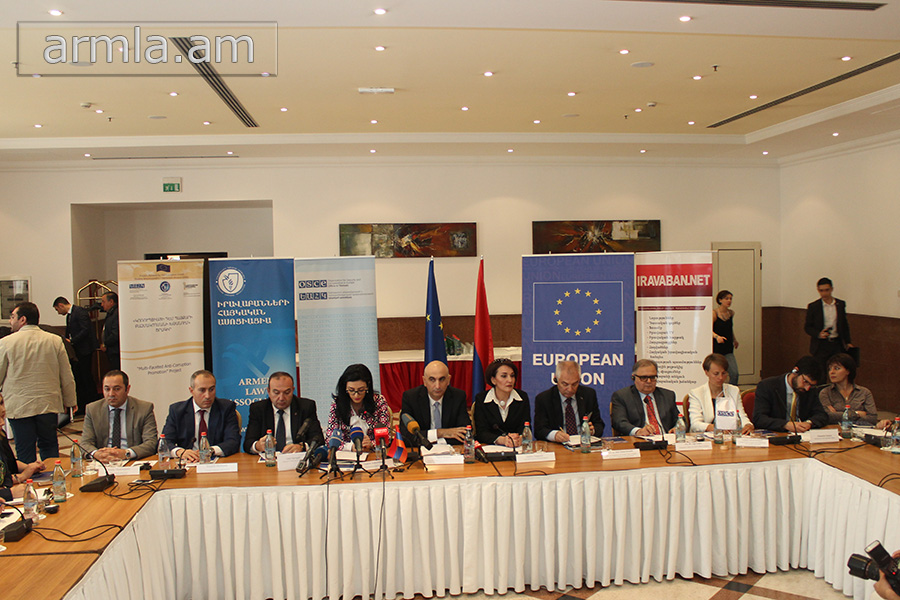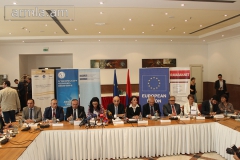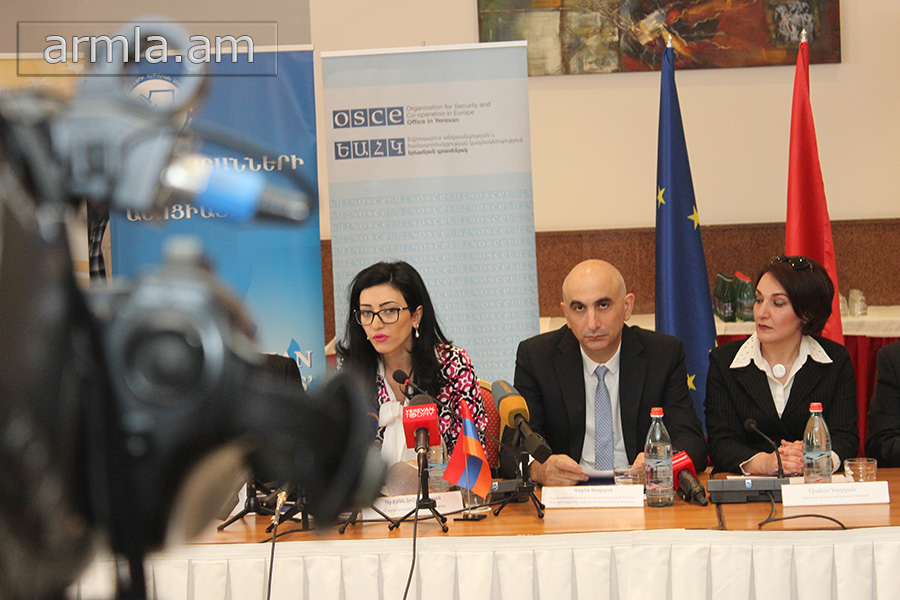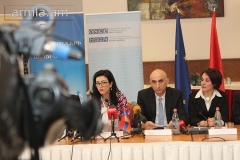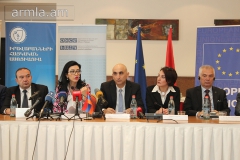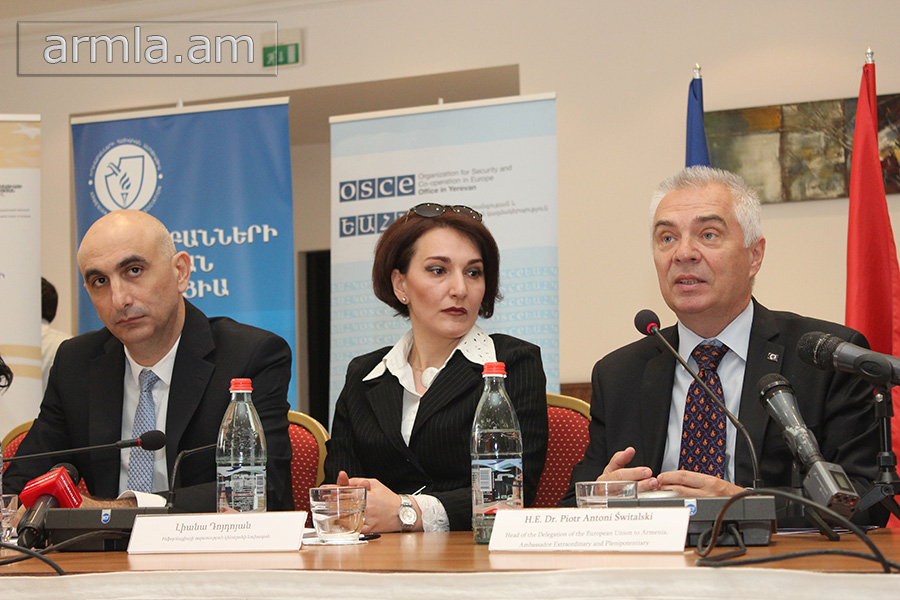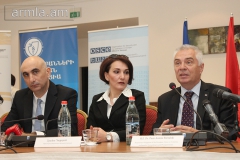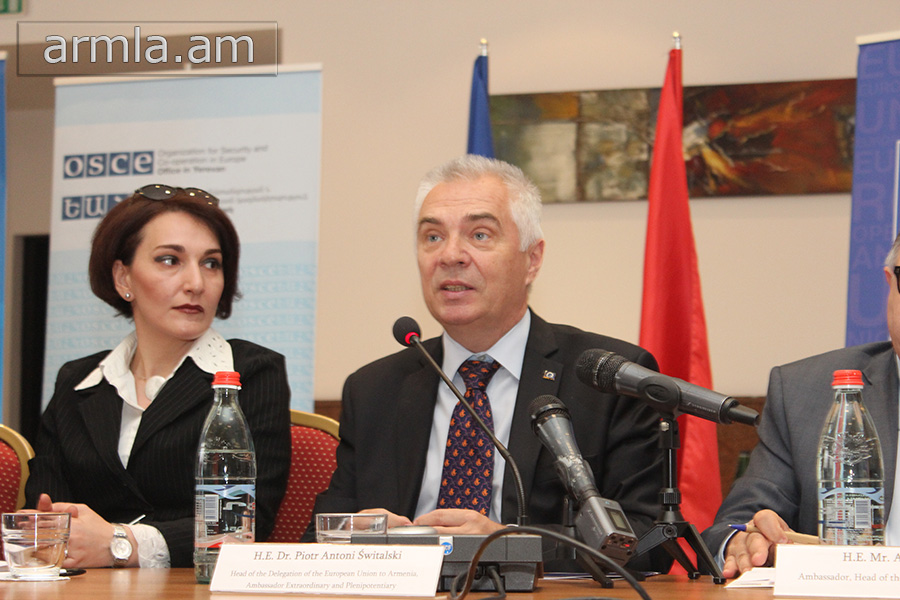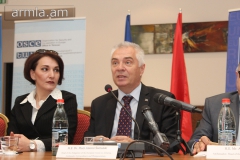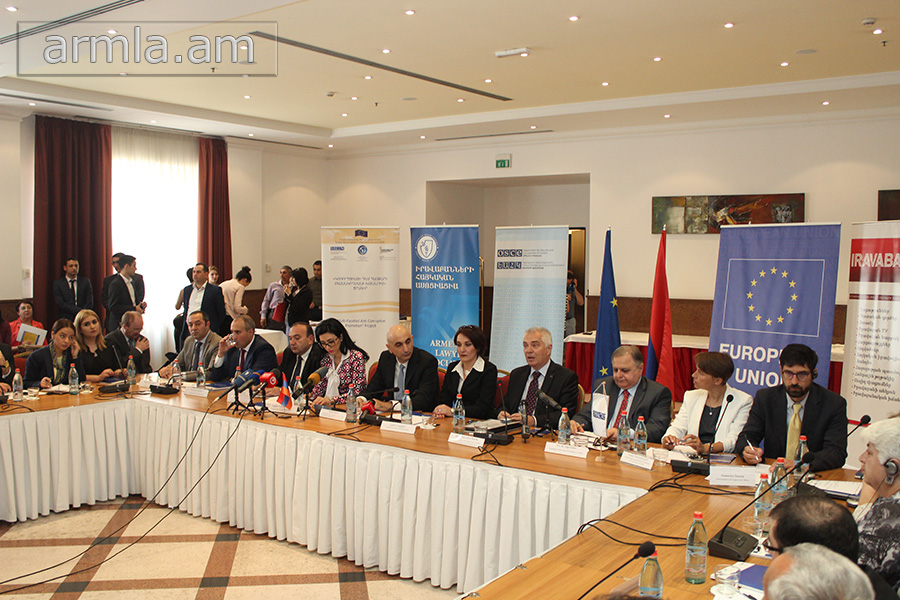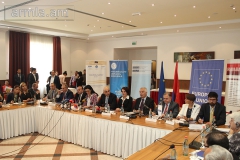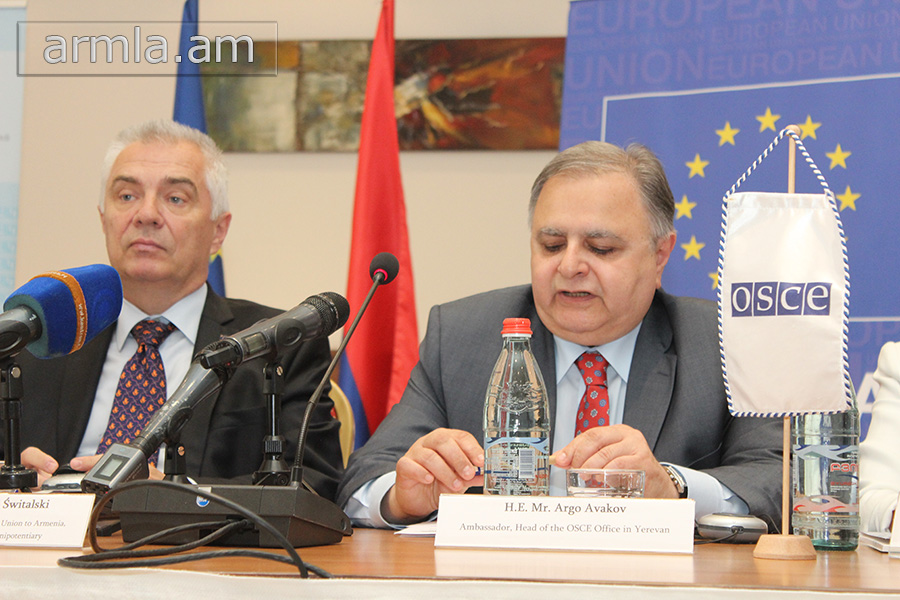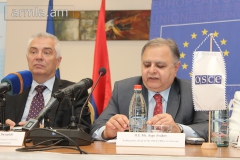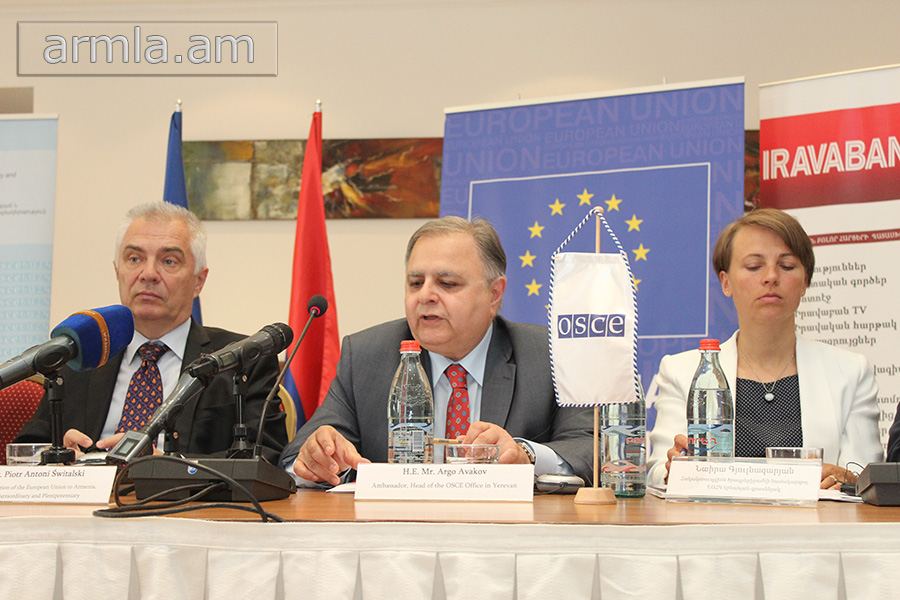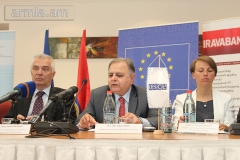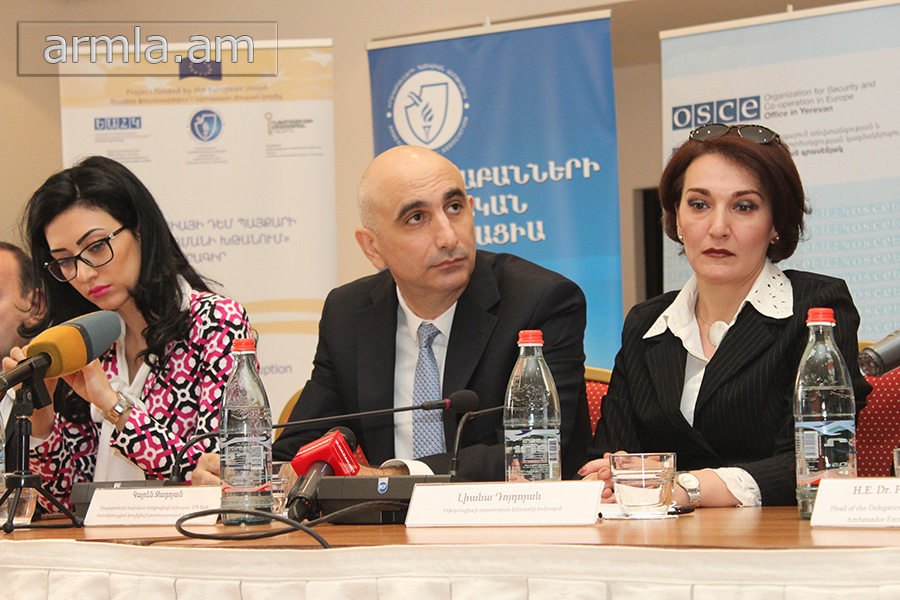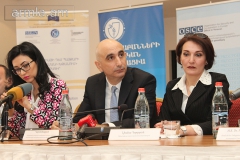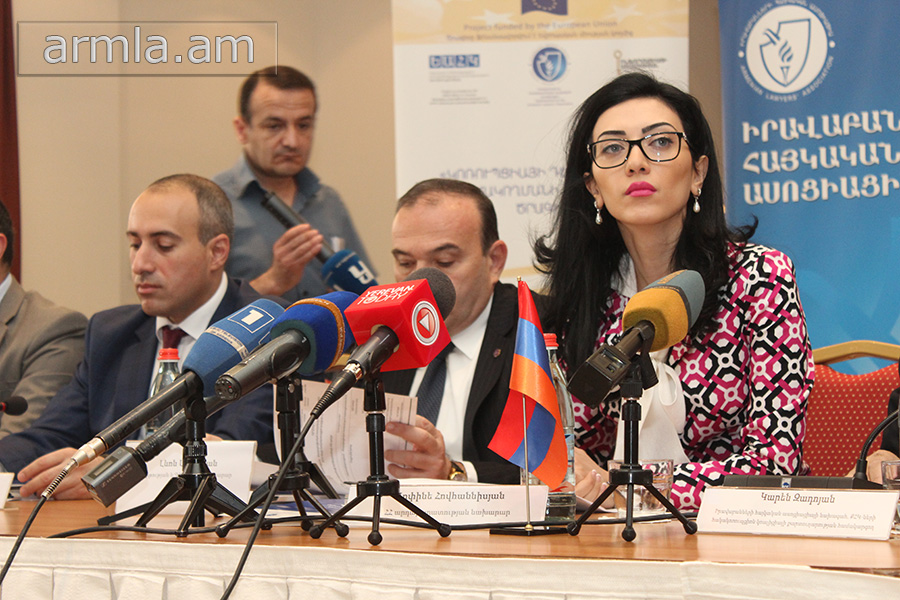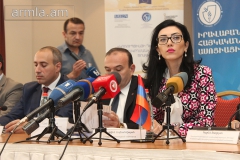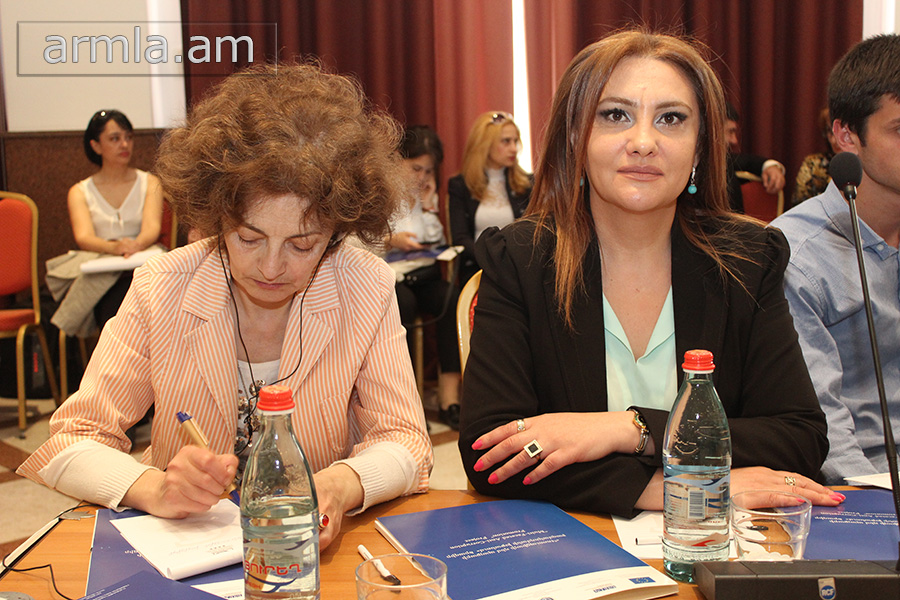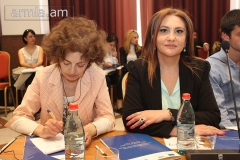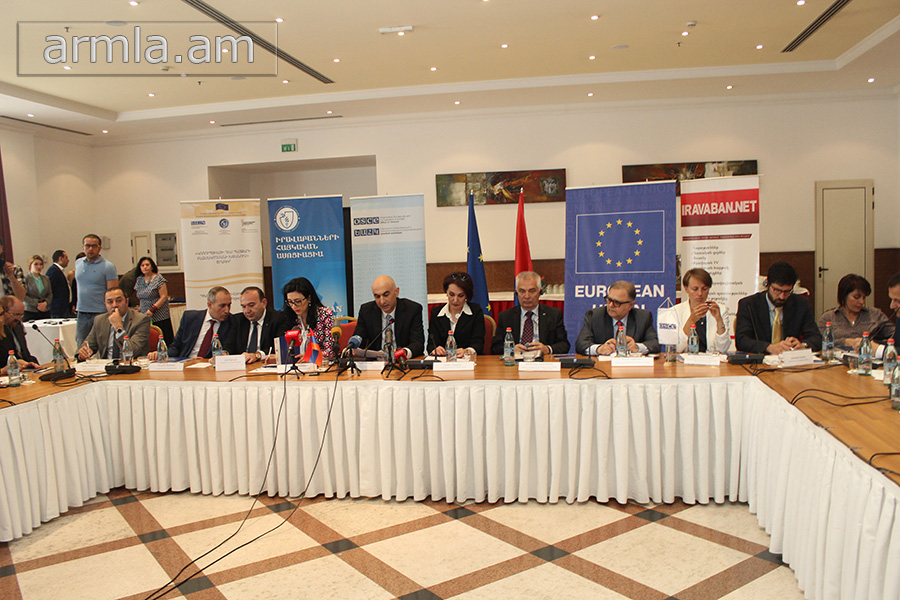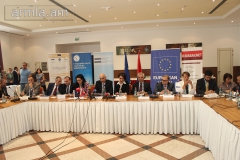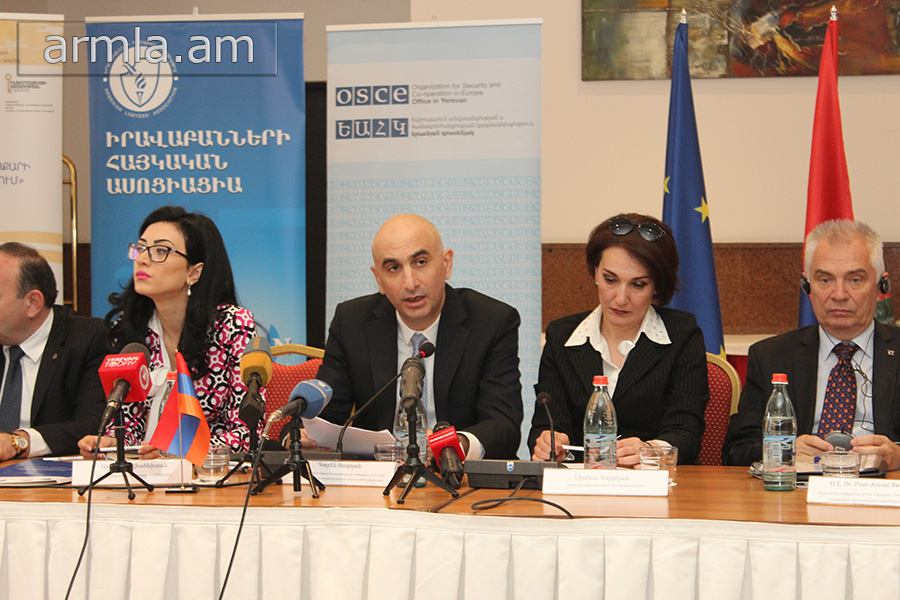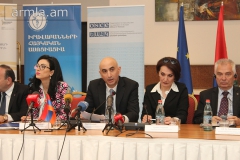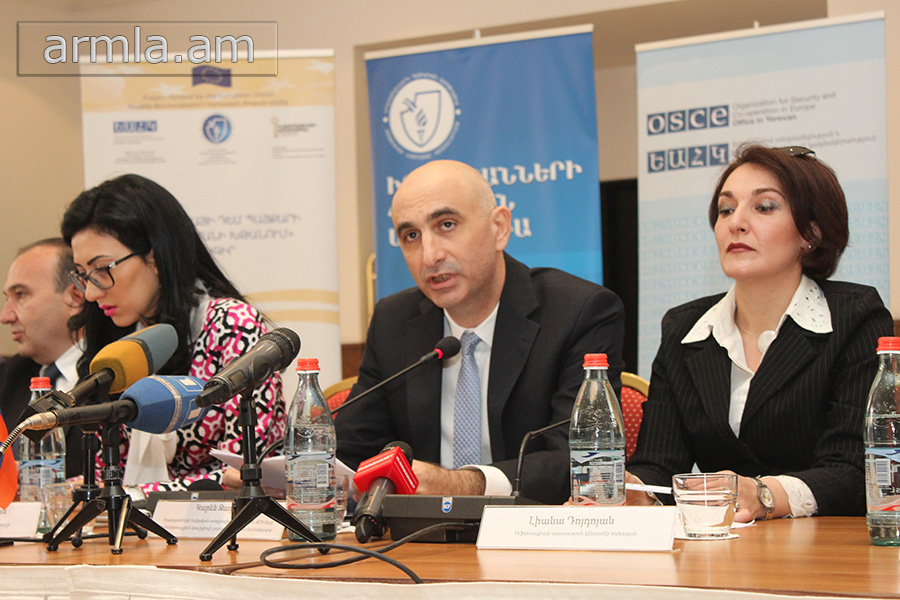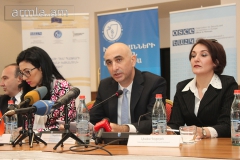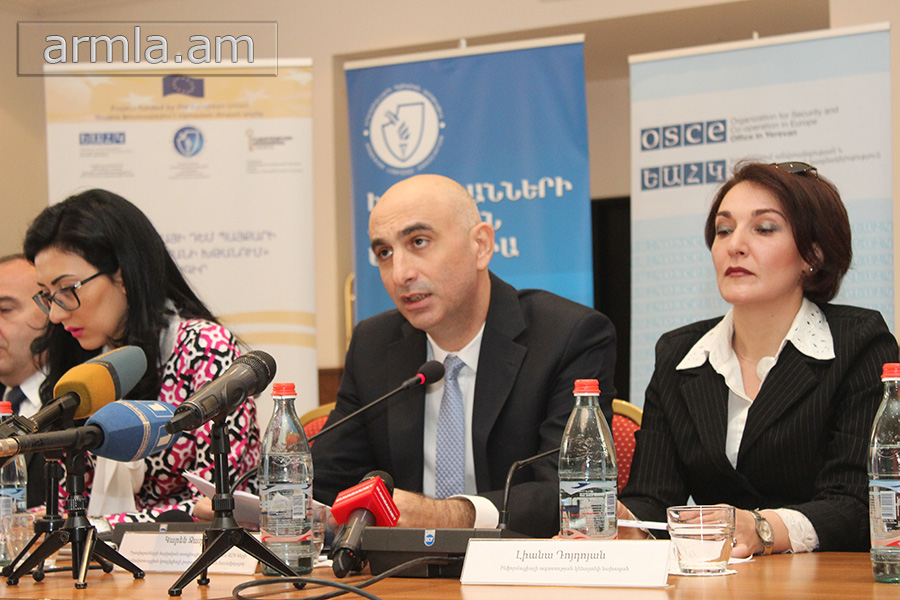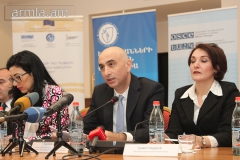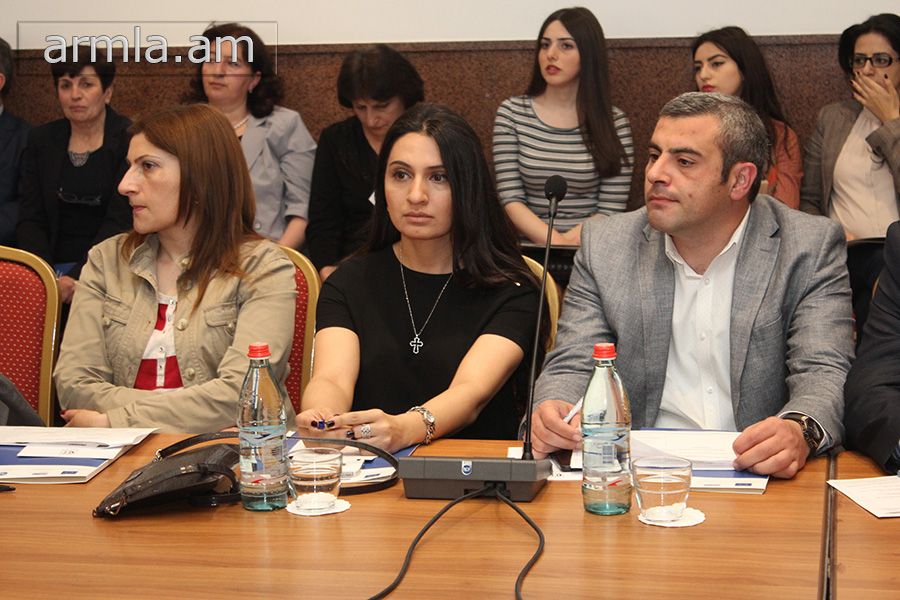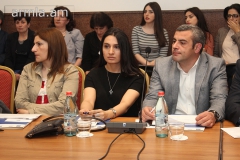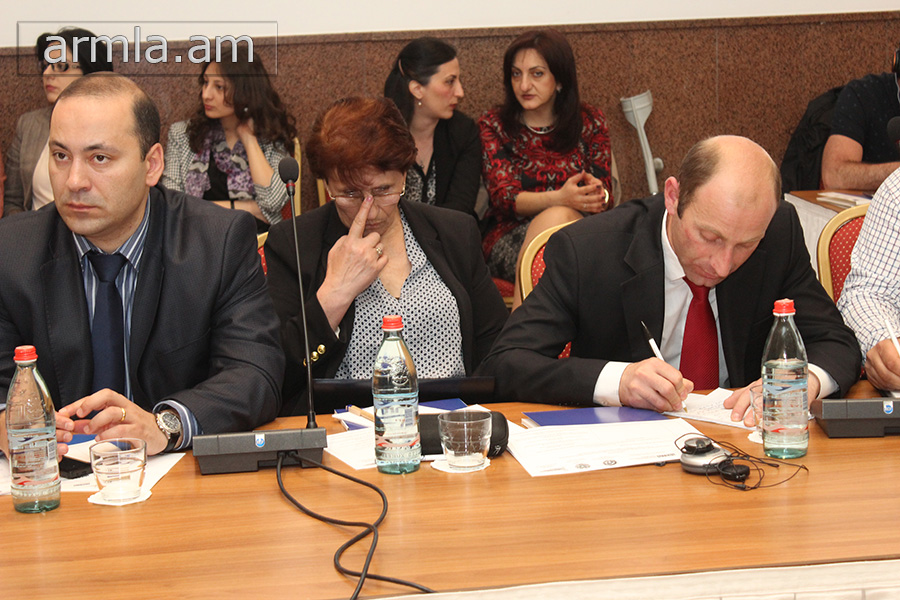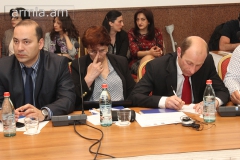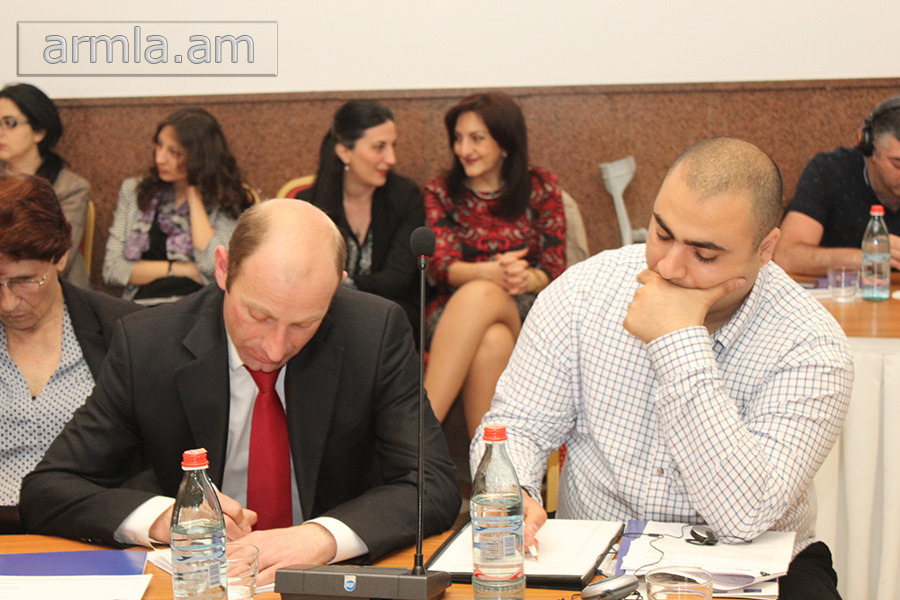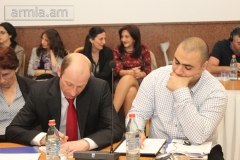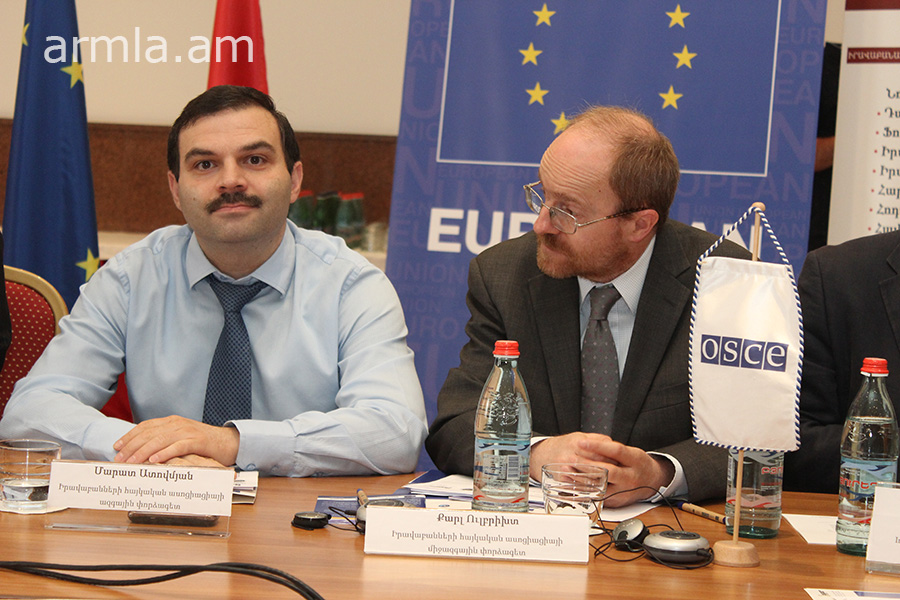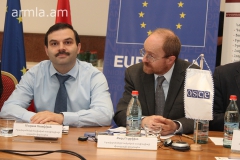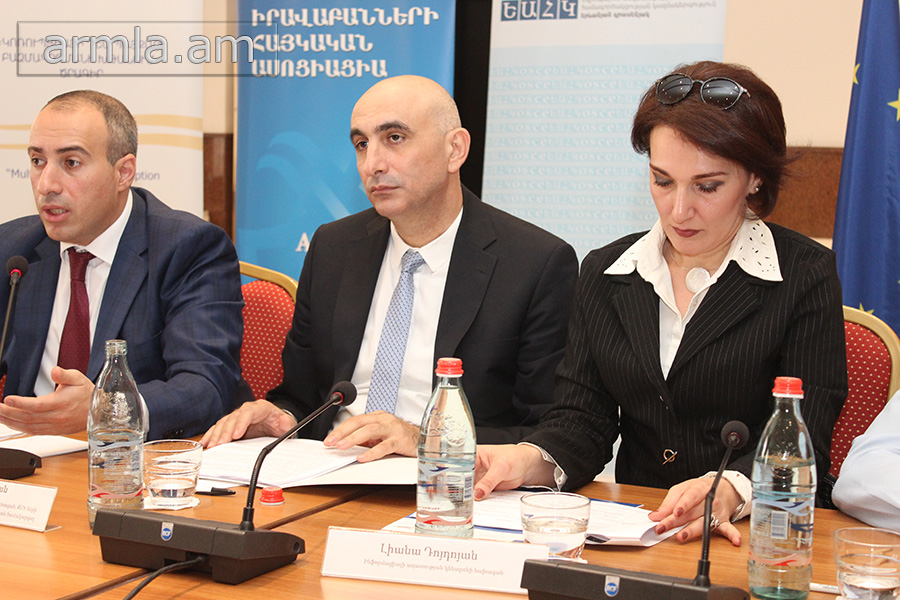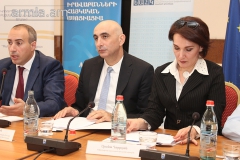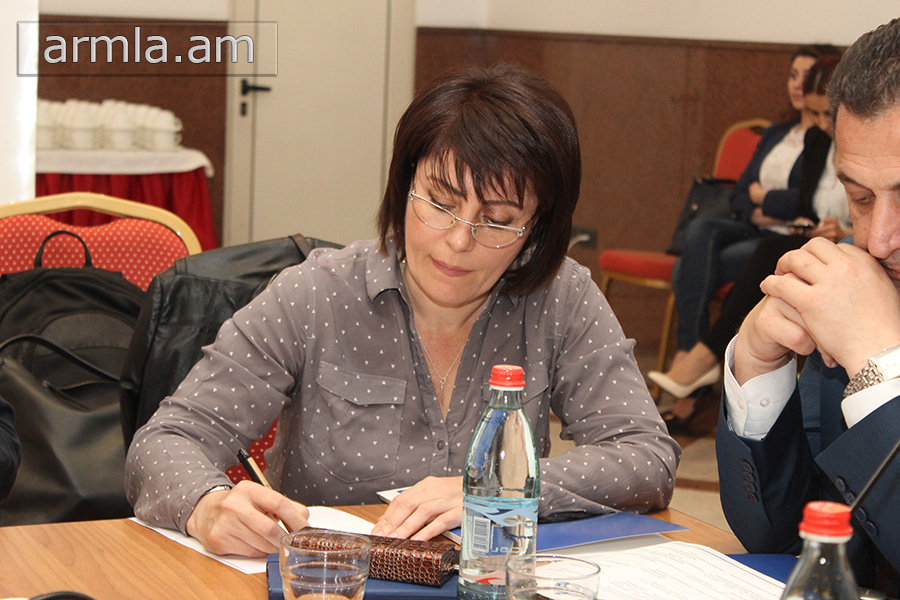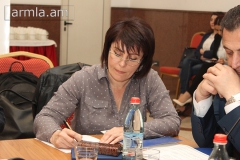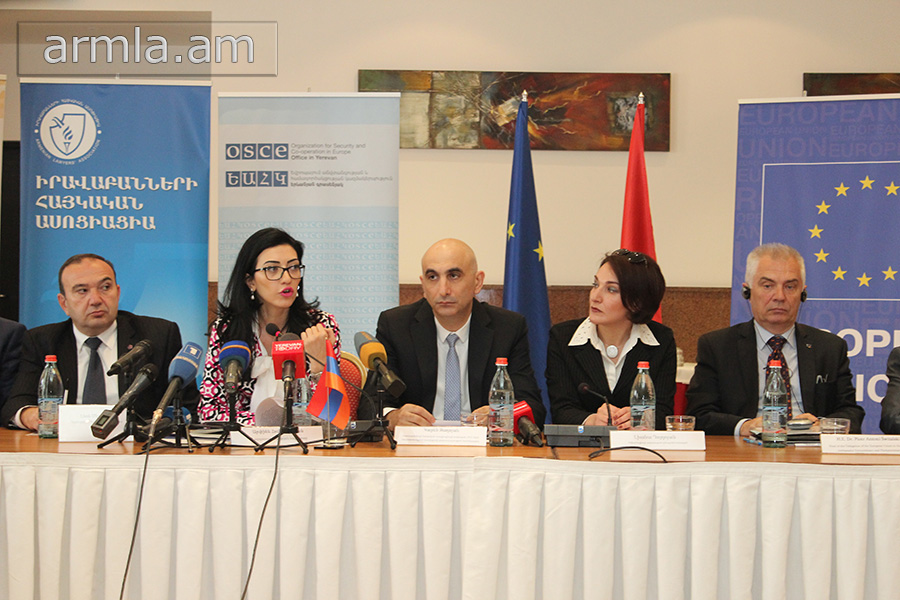
On May 13th, 2016 the Freedom of Information Centre of Armenia, in cooperation with the Armenian Lawyers’ Association (formerly “Armenian Young Lawyers Association” NGO), organised the “Government – Civil Society Anti-Corruption Conference”.
The event was organised in the scope of the “Multi-Faceted Anti-Corruption Promotion” Project (hereafter: Project) funded by the EU and co-funded by the OSCE Office in Yerevan.
140 representatives from state bodies, international organisations, political parties, civil society organisations and mass media participated in the conference.
Ms. Arpine Hovhannisyan, the RA Minister of Justice, H.E. Dr. Piotr Antoni Świtalski, the Head of the Delegation of the European Union to Armenia, Ambassador Extraordinary and Plenipotentiary, H.E. Mr. Argo Avakov, Ambassador, the Head of the OSCE Office in Yerevan, and Mr. Karen Zadoyan, the President of the Armenian Lawyers’ Association, the Coordinator of the Secretariat of the CSO Anti-Corruption Coalition gave welcoming speeches at the conference.
H.E. Dr. Piotr Antoni Świtalski, the Head of the Delegation of the European Union to Armenia, Ambassador Extraordinary and Plenipotentiary, expressed his belief that corruption is a threat first of all to the national security of Armenia.
“It is for me a big pleasure to be here with you and to offer our remarks on this very important topic. There is nothing more pleasant than to see the Government of Armenia represented at ministerial level or other public institutions of Armenia and the civil society sitting together around one common table and discussing the fight against corruption. As I have said on previous occasions I believe for Armenia the fight against corruption should become a matter of national unity, national consensus, a cause which would unite all stakeholders: the Government, the parties, all public institutions and all civil society. I think the recent events have demonstrated that the fight against corruption should become a priority. I remember the very important speech made by President Sargsyan last February. I can recall the recent statement by the Prime Minister where he, notwithstanding the achievements, expressed his dissatisfaction with the results of the fight against corruption. And I think it shows the awareness that the problem is of strategic importance to Armenia. And the recent events demonstrated that, including the cases of corruption in the defense sector, this is a matter of national security for Armenia. Corruption doesn’t make you stronger. Corruption makes Armenia weaker. And the fight against corruption is not only about better political governance, it’s not only about better rule of law, it’s not only about a fair redistribution of the national wealth. The fight against corruption is a matter of national security for Armenia. And if we approach the issue from this perspective I think we will be able to see visible changes,” said H.E. Dr. Piotr Antoni Świtalski.
RA Minister of Justice Arpine Hovhannisyan assured the participants of the conference that the mentioned issues are in the focus of the Government’s attention. “Two working groups have already been established in the scope of the Government-Civil Society Platform. These working groups have particular tasks to complete. To be more specific, the first one refers to the consideration of the issue of appropriateness of criminalisation of illicit enrichment, while the second one refers to conducting a research on the existing anti-corruption institutional systems,” said Arpine Hovhannisyan, stressing that the participation and support of the civil society is one of the guarantees of success in every area.
H.E. Mr. Argo Avakov, Ambassador, the Head of the OSCE Office in Yerevan, mentioned that civil society can also play a catalyst role inspiring cooperation aimed at fight against corruption. “Cooperation between the civil society, the government and the private sector has been created. We hope that it will be strengthened in the future,” he said.
According to Karen Zadoyan, as a result of the April war, the dangerous repercussions of corruption in Armenia became visible to our society. He pointed out the issues in fight against corruption that need to be tackled first. The first one of them is the elimination of impunity. “In this context, I think the criminalisation of illicit enrichment is imperative in our country”, said Mr. Zadoyan.
According to Mr. Zadoyan, the second priority is the restoration of big trust towards the system of justice, including the activities of the law enforcement agencies assisting in the administration of justice. The third one is creating an independent anti-corruption body on the legal basis. And the fourth important priority is the introduction of the institute for the protection and encouragement of whistleblowers based on a respective law. This institute will ensure effective fight against corruption.
The welcoming speeches were followed by presentations by Mr. Suren Krmoyan, the RA Deputy Minister of Justice, Mr. Armen Khudaverdyan, the Deputy President of the Commission on Ethics of High-Ranking Officials, Mr. Karen Zadoyan, the President of the Armenian Lawyers’ Association, the Coordinator of the Secretariat of the CSO Anti-Corruption Coalition, Mr. Kamo Asatryan, the Head of the RA Government’s Anti-Corruption Programmes Monitoring Division, Mr. Carl Ulbricht, the International Expert of the Project, Mr. Marat Atovmyan, the Local Expert of the Project, Mr. Varuzhan Hoktanyn, the Executive Director of the Transparency International Anti-Corruption Centre, Mr. Khachik Harutyunyan, an Expert from the same Centre, Mr. Hayk Chobanyan, the Deputy Director of the Union of Information Technology Enterprises, Mr. Arsen Abrahamyan, a Board Member of the Union of Communities of Armenia, the Mayor of Artik, and Mr. Menua Brutyan, the President of the “Lori Citizens’ Union” NGO, a Member of the Lori Region CSO Group of the CSO Anti-Corruption Coalition. The presentations were dedicated to the Government-Civil Society cooperation and anti-corruption activities carried out in Armenia.
Deputy Minister of Justice Mr. Suren Krmoyan spoke on the topic of perspectives of cooperation with specialised civil society organisations towards reducing corruption risks and implementing an anti-corruption strategy. He presented the work that had been completed, as well as the upcoming activities.
Deputy President of the Commission on Ethics of High-Ranking Officials Mr. Armen Khudaverdyan presented a report on the topic of “Importance of the System of Income and Asset Declarations in Fight against Corruption: Challenges and Possibilities of Cooperation with CSOs”.
Mr. Kamo Asatryan, the Head of the RA Government’s Anti-Corruption Programmes Monitoring Division, spoke about the possibilities of cooperation with CSOs in the scope of the Government’s Council of Fight against Corruption.
The possibility of introducing efficient mechanisms of fight against corruption and possibilities of cooperation on this matter were presented by Mr. Carl Ulbricht, the International Expert of the Project, who spoke about the work of the two above mentioned working groups which make steps in the directions of criminalisation of illicit enrichment and the institutional system of fight against corruption. Mr. Ulbricht presented the international practices of Romania and Latvia. When speaking about the cooperation between CSOs and the Government, he mentioned that there are other areas of cooperation as well, in particular, the sphere of anti-corruption education and the business sector. In addition, according to him, it is possible to work jointly on the elaboration of indexes for the monitoring of the Anti-Corruption Strategy Implementation Action Plan for 2015-2018.
Local Expert of the Project Mr. Marat Atovmyan also spoke about the possibility of introducing efficient mechanisms of fight against corruption and possibilities of cooperation on this matter. He presented two institutional anti-corruption systems and suggested establishing an independent anti-corruption body which will be busy carrying out all anti-corruption functions, particularly the investigative, educational and preventive functions. In case it is impossible to realise this option, he suggests forming an independent anti-corruption body which will carry out educational and preventive functions and simultaneously turning the RA Special Investigation Service into a specialised institution which will investigate corruption offenses.
Executive Director of the Transparency International Anti-Corruption Centre Mr. Varuzhan Hoktanyan presented the anti-corruption policy in Armenia. According to him, one of the most important steps in fight against corruption is intolerance towards monopolies.
Mr. Khachik Harutyunyan, expert at the same organisation, spoke about the challenges of overcoming corruption in the business sector.
Deputy Director of the Union of Information Technology Enterprises Mr. Hayk Chobanyan presented the corruption problems in the business sector, noting that it will be possible to solve these problems only in case of business representatives’ real participation.
Mr. Arsen Abrahamyan, a Board Member of the Union of Communities of Armenia, the Mayor of Artik, spoke about the corruption risks existing in the sector of LGBs (local governing bodies), as well as the work currently implemented towards their reduction. He also spoke about the introduction of efficient mechanisms ensuring the participation of the population in the decision-making process in Artik City, including the mechanisms brought about by contemporary technologies.
According to Mr. Arsen Abrahamyan, decision-making, collection of personal income and the procurement process are vulnerable at the local level. Thus, from the perspective of corruption the sector of decision-making is the most vulnerable one which can be explained with the “elusive character of hidden motives”. Therefore, special attention is required here. The sphere of decision-making must become participatory and as transparent as possible, and the content must be conceivable for the public. The procurement process is regulated by the state through the corresponding legislation, including electronic procurement system which is an effective mechanism for reduction of corruption risks. However, in order to reduce them, public oversight of the procurement process is needed as well. It can be implemented by ensuring transparency and openness at all stages of the process.
Mr. Menua Brutyan, the President of the “Lori Citizens’ Union” NGO, a Member of the Lori Region CSO Group of the CSO Anti-Corruption Coalition, spoke about the challenges of fight against corruption in the regions.
After the reports ended, the speakers were asked questions.
Mr. Davit Amiryan, the Deputy Director of the Open Society Foundations Armenia, asked Mr. Kamo Asatryan the following question: How does the Anti-Corruption Council cooperate with ministries, particularly the Ministry of Education and Science. Mr. Asatryan noted that they are guided by internal rules and regulations, as well as recommendations. A question was asked about last year’s alarming statement on corruption risks made by the Green Bean company. Mr. Asatryan responded that in that case respective recommendations had been given to the Ministry of Finance, the Ministry of Territorial Administration and Emergency Situations so that they could find a solution to this problem, as a result of which the representative of the Green Bean had finally expressed his satisfaction with the solution of the problem.
In addition, some participants asked questions on the corruption problems existing in the judicial and legal system. “I can say that nothing will improve unless there is an independent judiciary”, noted Mr. Karen Zadoyan.
At the end of the conference, the representatives of the Government and the CSO Anti-Corruption Coalition of Armenia agreed upon making the questions and problems raised during the conference the subject of upcoming working discussions and jointly finding solutions to them.

